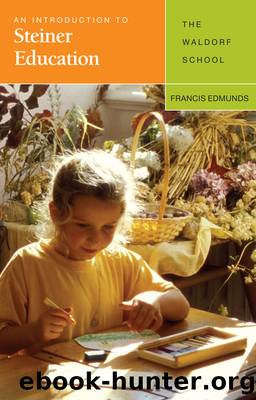An Introduction to Steiner Education by Francis Edmunds

Author:Francis Edmunds
Language: eng
Format: epub
Publisher: Rudolf Steiner Press
Published: 2012-08-14T16:00:00+00:00
6
ADOLESCENCE
With puberty we enter the third period of childhood. It may be compared in history to the passage from the Middle Ages into modern times—an entry into a totally new relationship with the world. Once again soul forces are released which were previously at work within the organism, this time more particularly from the rhythmic system; there is a further readjustment between body, soul and spirit. The forces which are now freed provide the basis for a personal life of feeling; for the first time life becomes a personal affair, an individual questioning of existence in all things big and small. It is not that younger children do not question and that the answers they receive do not directly concern them, but now the emphasis is more on thought. Subject confronts object far more sharply—the need to justify relationships, not merely to accept them, asserts itself. The wish arises to make one’s life one’s own.
This awakening to the inner self first expresses itself as the beginnings of an independent life of thought; it becomes a search through the idea for the ‘ideal’—a longing, as Rudolf Steiner says, to discover that the world is based on truth. This longing for the ideal may take different forms: it may appear as a restlessness to leave school, enter life and become an adult quickly; it may be charged with romantic imaginings— ‘castles in the air’; it may be seized by vain ambitions or be driven by desires. Much will depend on background conditions and the education that went before. What thus awakens is, at its best, an inner dream of higher goals and possibilities. In the new questioning about life and in the personal search for truth which begins at this third stage of child development, we may recognize the first stirring of the spirit within the wakening human mind.
In a real sense the adolescent begins to discover himself in the world of ideas. He enjoys ideas as the younger child enjoys pictures and the still younger child play. To begin with it is almost like a new game—the will to argue, to assert or to contradict opinions—but it is far more than that; this new life in self-sustained ideas is like stepping into a realm of freedom where the inner life first begins to experience its independent nature. Hence the demand for independence which, to the young adolescent, intoxicated with this sweet and liberating sense of freedom, seems so justified, and to the adult, who still views him as a child, so perplexing.
The adolescent begins to question all things: himself, the world, the authority of parents and teachers, the meaning of destiny, the values of life or the value of life itself. It is a moment of release; yet it brings with it added loneliness. The following poem1 by A.E. expresses this well.
Download
This site does not store any files on its server. We only index and link to content provided by other sites. Please contact the content providers to delete copyright contents if any and email us, we'll remove relevant links or contents immediately.
| Administration | Assessment |
| Educational Psychology | Experimental Methods |
| History | Language Experience Approach |
| Philosophy & Social Aspects | Reform & Policy |
| Research |
The Art of Coaching Workbook by Elena Aguilar(48037)
Trainspotting by Irvine Welsh(20045)
Twilight of the Idols With the Antichrist and Ecce Homo by Friedrich Nietzsche(17703)
Fangirl by Rainbow Rowell(7827)
Periodization Training for Sports by Tudor Bompa(7323)
Change Your Questions, Change Your Life by Marilee Adams(6637)
This Is How You Lose Her by Junot Diaz(5753)
Grit by Angela Duckworth(4728)
Red Sparrow by Jason Matthews(4654)
Asking the Right Questions: A Guide to Critical Thinking by M. Neil Browne & Stuart M. Keeley(4566)
Paper Towns by Green John(4164)
Room 212 by Kate Stewart(4099)
Ken Follett - World without end by Ken Follett(3968)
The Sports Rules Book by Human Kinetics(3581)
Housekeeping by Marilynne Robinson(3396)
The Motorcycle Diaries by Ernesto Che Guevara(3325)
Introduction to Kinesiology by Shirl J. Hoffman(3297)
Exercise Technique Manual for Resistance Training by National Strength & Conditioning Association(3286)
Double Down (Diary of a Wimpy Kid Book 11) by Jeff Kinney(3267)
